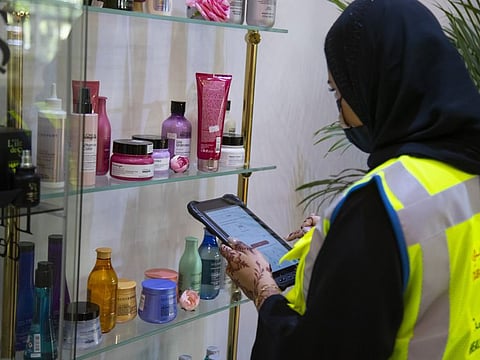Watch: Dubai Municipality inspects beauty salons ahead of Eid rush, warns against malpractices
Penalties for lack of hygiene, poor sanitisation, unauthorised staff and overcrowding

Dubai: Ahead of the Eid rush, Dubai Municipality has intensified inspections in beauty parlours and salons and warned them against malpractices.
Violations, including lack of hygiene and sanitisation, providing unauthorised services, hiring unauthorised staff, overcrowding, double-dipping in wax can attract penalties, the Health and Safety Department under the municipality has warned.
Gulf News joined the department’s inspection drive and witnessed how the inspectors monitor the safety of the products and services.

Common violations, penalties
“Some of the commonly found violations are related to the cleanliness of tools and equipment, lack of occupational health card [for employees], providing unauthorised services, poor ventilation and wrong practises such as not consulting the customer before performing a service,” said Dr Naseem.
She said penalties for violations vary from warnings, fines and other actions, including instant closure of salons, depending upon the type of violations.
She said beauty salons should maintain the health, safety and welfare of all individuals, including staff, clients and visitors, at all times. “All salons should operate by following the guidelines, circulars and notices issued by Dubai Municipality,” Dr Naseem emphasised.
COVID-19 restrictions
In line with the latest updates on COVID-19 precautionary measures and instructions issued by the Supreme Committee of Crisis and Disaster Management in Dubai, Dr Naseem said salons now operate with 100 per cent capacity. “However, wearing face masks by staff continues to be mandatory. Face masks must be worn by the clients too. It can be removed while receiving services where it is required only.”
Though salons can operate with full capacity, the official reminded that they should not be overcrowded. “They should not exceed the maximum capacity of the salon.” Maintaining cleanliness and hygiene of the entire facility should be followed at all times, she reminded. “Cleaning, sanitisation and sterilisation are a must for multi-use tools and instruments before and after each use.” Inspectors check the shared tools for cleanliness and sanitisation requirements. Chairs and equipment should be sanitised after serving each customer.
No double-dipping
Dr Naseem said salons should provide appropriate equipment and tools and ensure they are adequately maintained. “Providing necessary single-use or disposable tools is a must.” During the inspection, inspectors check if disposable tools are used multiple times. One important service where the single use of the tool (spatula) is mandatory is waxing. Dubai Municipality has enforced a “no double-dipping” policy at salons. Double-dipping refers to a salon employee using a spatula to apply wax to a client’s skin and then reusing that same spatula after dipping it in the wax pot multiple times. Salons have been instructed to avoid this practice in order to ensure there is no transmission of bacteria or diseases from one customer to another. The same spatula should not be reused even for the same customer, unless the salon is using separate wax containers and wax for each customer.
Chemical henna
Salons have also been warned against using henna mixed with harmful chemicals. Inspectors take samples of henna from salons to ensure they are safe. “All individuals must be protected against any risk that may occur as a result of activities and services in the salon,” said Dr Naseem. Maintaining personal hygiene and safe practises by staff are of paramount importance, she said. “Hazardous chemicals or substances should be handled and stored securely and risk of emission should be controlled. Qualified staff to provide supervision and instruction should be available at all times.”
Occupational health card
Dubai Municipality has also prohibited staff from working without obtaining occupational health cards. Salons cannot hire unauthorised staff to meet the Eid rush. All employees should have a valid occupational health card.
One of the first documents that the inspectors verify is the record of occupational health cards of each and every employee providing beauty services. Occupational health cards are issued after medical tests prove that the bearer of the card is free from infectious diseases and fit to work in their category of job. Inspectors also check the trade licence of the establishments to ensure they are authorised to provide the beauty services.
Product safety
All products are checked to ensure they are registered under the Montaji Application of the department and samples are taken for lab tests. Salons are also required to mention the opening dates of the beauty products to ensure they are used within the shelf-life.
All metal tools must be washed with water and then soaked in antiseptic liquid before being kept inside the UV steriliser box.



